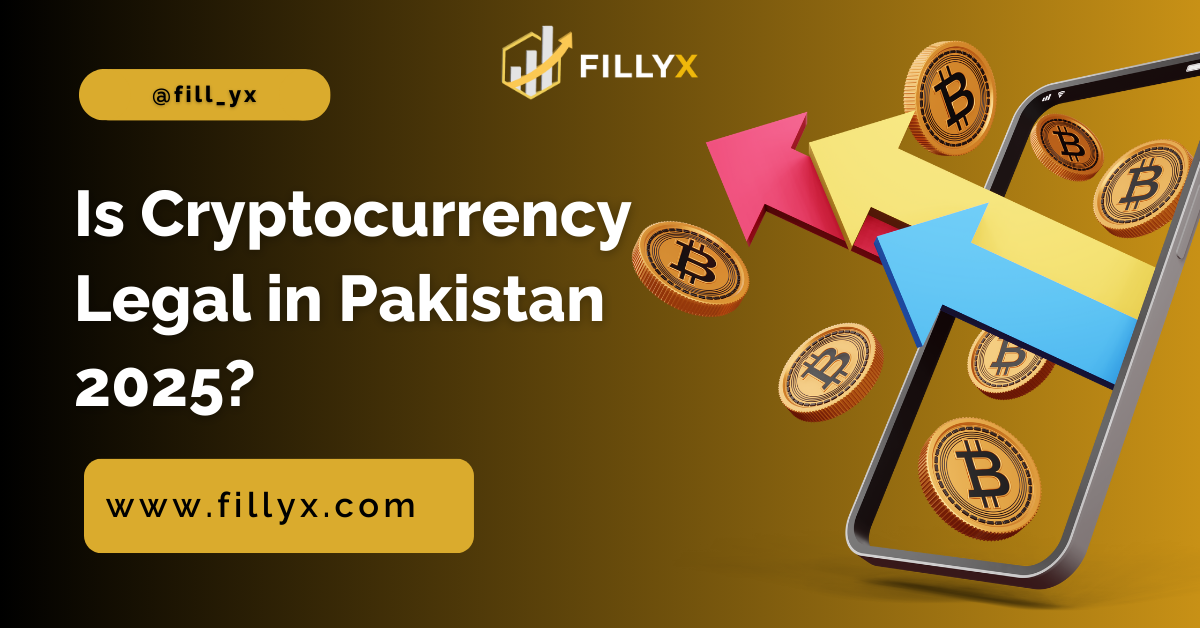The question, “Is cryptocurrency legal in Pakistan in 2025?” has sparked intense debate among investors, policymakers, and tech enthusiasts alike. As digital currencies like Bitcoin and Ethereum grow in popularity worldwide, Pakistan is also stepping into this evolving space. The country has had a mixed relationship with crypto, ranging from uncertainty and restrictions to recent steps toward creating proper regulations. This shows how Pakistan’s financial system is slowly adapting to new technologies.
In this article, we’ll break down the current legal status of cryptocurrency in Pakistan in 2025. We’ll cover the rules and regulations, what the government is doing, how taxes apply, and what this means for people interested in crypto. Whether you’re experienced or just getting started, this Fillyx guide will help you understand where Pakistan stands with digital currencies today.
The Historical Context of Cryptocurrency in Pakistan
To understand the current legal status of cryptocurrency in Pakistan, it’s essential to trace its historical trajectory. Cryptocurrencies gained popularity in Pakistan around 2015, fueled by the global Bitcoin boom. By 2017, the crypto craze reached new heights, with Bitcoin’s value soaring by over 1,300%. However, this surge raised concerns among Pakistani authorities, particularly the State Bank of Pakistan (SBP) and the Federal Board of Revenue (FBR).
In April 2018, the State Bank of Pakistan (SBP) released a notice banning banks and financial institutions from handling cryptocurrency transactions. The reason given was the risk of money laundering and financing terrorism. As a result, while people could still own digital currencies, they faced major difficulties when trying to trade them through legal banking systems.
The Legal Status in 2025: A Shift Toward Regulation
In 2025, Pakistan’s stance on cryptocurrency has evolved significantly, moving from outright bans to a more proactive regulatory approach. The establishment of the Pakistan Crypto Council (PCC) and the Pakistan Digital Assets Authority (PDAA) marks a historic pivot.
However, the legal status of cryptocurrency in Pakistan in 2025 remains complex. While cryptocurrencies are not banned, they are not recognized as legal tender. The SBP and the Ministry of Finance have clarified that crypto transactions are illegal under current regulations.
Key Regulatory Developments in 2025
Several key developments in 2025 highlight Pakistan’s shift toward embracing digital assets:
Pakistan Crypto Council (PCC): PCC launched in March 2025 and PCC aims to foster innovation while protecting investors. It is working on regulatory sandboxes to allow crypto startups to operate in a controlled environment.
Pakistan Digital Assets Authority (PDAA): It is established to oversee crypto activities. The PDAA ensures compliance with anti-money laundering (AML) and counter-terrorism financing (CFT) standards, aligning with FATF recommendations.
Strategic Bitcoin Reserve: This announcement, made at Bitcoin Vegas 2025, shows Pakistan’s growing interest in including cryptocurrencies in its economic plans. However, the State Bank of Pakistan (SBP) has stated that there is still no official legal framework for such a reserve, pointing to ongoing gaps in the country’s policy.
Taxation Policies: Starting July 1, 2025, profits from crypto sales are subject to a 15% Capital Gains Tax (CGT), while income from mining or staking is taxed as regular income (5-35%). These measures aim to bring crypto transactions into the tax net, potentially generating significant revenue.
Challenges in the Crypto Landscape
Despite these advancements, several challenges persist:
Policy Inconsistencies: Contradictory statements from government officials create confusion. While the PCC promotes crypto adoption, the SBP and Ministry of Finance maintain that cryptocurrencies remain illegal until a legal framework is enacted.
Banking Restrictions: The 2018 SBP ban on banks facilitating crypto transactions remains in effect. It forcing traders to rely on peer-to-peer (P2P) platforms like Binance, Paxful, and LocalBitcoins. This exposes users to risks like scams and account freezes.
Enforcement and Oversight: The Federal Investigation Agency (FIA) has cracked down on unregulated crypto activities, particularly those linked to money laundering. Without clear regulations, traders face scrutiny and potential legal repercussions.
Infrastructure Limitations: Pakistan’s electricity network and internet reliability pose challenges for crypto mining and trading, despite the allocation of 2,000 megawatts for Bitcoin mining and AI data centers.
How to Trade Crypto Safely in Pakistan
For those looking to navigate the crypto market in Pakistan, safety is paramount. Here are some tips:
Choose Reputable Platforms: Use established exchanges like Binance, Fillyx, Bitget, or Paxful, which support P2P trading and local payment methods.
Implement Security Measures: Enable two-factor authentication (2FA) and use cold storage for assets to protect against hacks.
Stay Informed: Monitor updates from the PCC and PDAA to ensure compliance with evolving regulations.
Tax Compliance: Report crypto gains to the FBR to avoid penalties, as taxation is now enforced.
The Future of Cryptocurrency in Pakistan
The question, “Is cryptocurrency legal in Pakistan in 2025?” does not yet have a definitive answer, but the trajectory is clear. Pakistan is moving toward a regulated crypto ecosystem, driven by global trends and domestic demand. The PCC and PDAA are pivotal in shaping a framework that balances innovation with security. However, until parliamentary approval is secured, cryptocurrencies remain in a legal gray area.
The government’s proactive steps, including the Strategic Bitcoin Reserve, signal a commitment to embracing digital finance. Yet, challenges like policy inconsistencies and infrastructure limitations must be addressed to unlock the full potential of cryptocurrencies. For now, crypto enthusiasts can engage with the market through P2P platforms, but caution and compliance are key.
The Fillyx Perspective
These changes are especially important for platforms like Fillyx. A clear set of regulations means Fillyx can operate in a secure and legally compliant way. With this clarity, it can offer services that follow the rules, giving users in Pakistan more confidence when dealing with digital assets. As the crypto market becomes more structured, it opens the door to new ideas and growth for platforms focused on digital assets. Fillyx is dedicated to helping build a strong, well-regulated crypto economy in Pakistan.
Conclusion: A Regulated Future for Crypto in Pakistan
In conclusion, “Is cryptocurrency legal in Pakistan 2025?” The answer is a clear yes, under a newly established, comprehensive regulatory framework. Pakistan is gradually moving away from the uncertain and informal days of crypto trading. With the formation of PVARA and initiatives like the Bitcoin Reserve and dedicated energy for mining, the country is showing a clear commitment to adopting virtual assets and blockchain technology. Although the transition is still in progress, 2025 stands out as a key turning point, bringing Pakistan closer to a well-regulated and crypto-friendly future.
Ready to explore the world of cryptocurrency in Pakistan? Stay ahead of the curve with Fillyx’s expert insights and resources. Join our community to access the latest updates, trading tips, and regulatory news to navigate the crypto market confidently.
Discover the future of digital finance with Fillyx!
Join our community and stay informed:
Website: Fillyx Website
X (formerly Twitter): Fillyx Twitter Profile
LinkedIn: Fillyx LinkedIn Page
Frequently Asked Questions (FAQs) – Is Cryptocurrency Legal in Pakistan 2025?
Yes, as of July 2025, the legal status of cryptocurrency in Pakistan has significantly clarified. The President of Pakistan signed the Virtual Assets Ordinance, 2025, which establishes the Pakistan Virtual Asset Regulatory Authority (PVARA) to regulate virtual assets.
PVARA is an independent federal body established under the Virtual Assets Ordinance, 2025. Its primary role is to license, regulate, and supervise all Virtual Asset Service Providers (VASPs) operating in Pakistan. This includes ensuring compliance with anti-money laundering (AML) and counter-terrorist financing (CTF) standards.
If you are an individual or company offering virtual asset services (e.g., exchanges, custodians, wallet providers) in or from Pakistan, you will need to be licensed by PVARA. For individual users engaging in personal trading on regulated platforms, the focus will be on using licensed service providers and adhering to their Know Your Customer (KYC) and Anti-Money Laundering (AML) procedures.
Yes, the State Bank of Pakistan has announced plans to launch a pilot program for a digital rupee, signaling its move towards modernizing Pakistan’s financial system and embracing central bank digital currencies (CBDCs).
Yes, the government has allocated 2,000 megawatts of surplus electricity in the initial phase for Bitcoin mining and AI data centers, indicating a strategic intent to leverage the country’s energy resources for digital economy growth.






